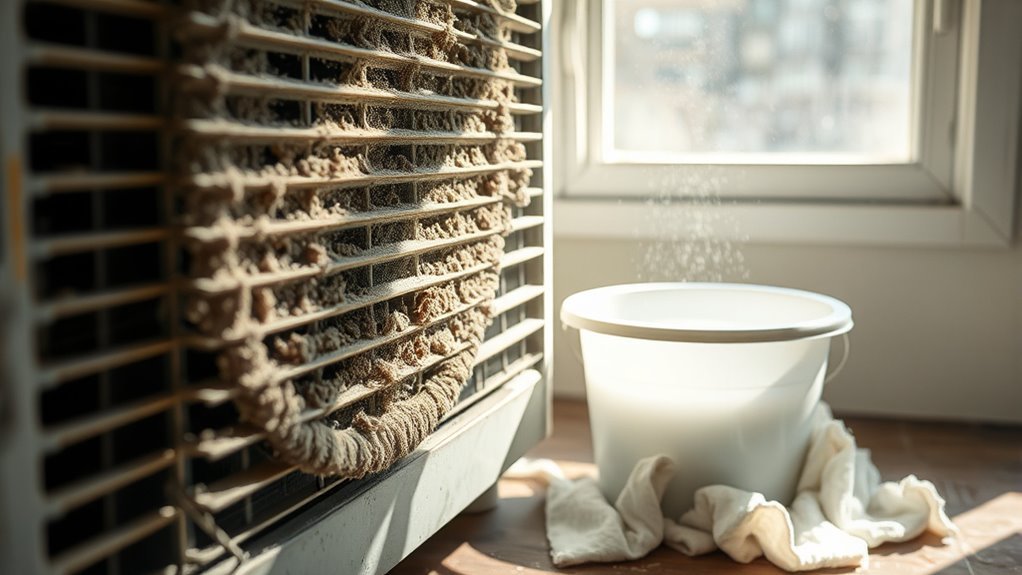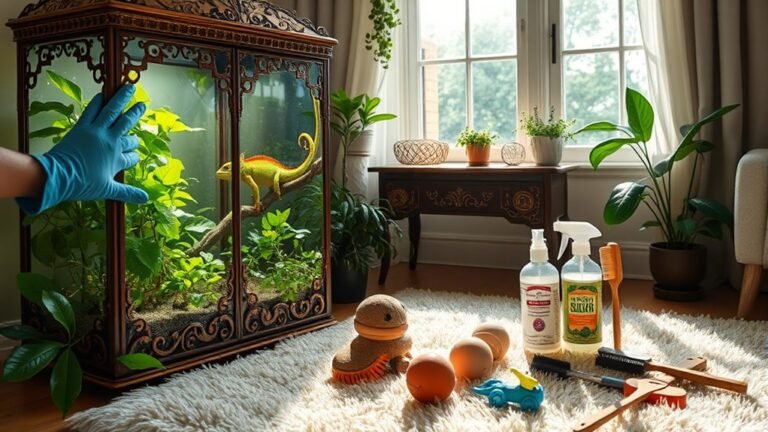Mistakes to Avoid When Cleaning Your AC
When cleaning your AC, always turn off the power to avoid electrical shock or damage. Don’t use harsh chemicals—they can corrode essential parts and reduce efficiency. Be sure to check and replace air filters regularly to maintain airflow and air quality. Avoid overwatering components, which can cause moisture damage. Finally, don’t skip professional maintenance for thorough diagnostics and early issue detection. Understanding these common pitfalls helps you protect your AC and optimize its performance.
Neglecting to Turn Off the Power

One critical mistake people often make when cleaning their AC is neglecting to turn off the power. Before you begin, always disconnect the unit from its power source to guarantee your safety. This step is a fundamental safety precaution that prevents electrical shock or accidental activation of the compressor or fan during maintenance. Locate the circuit breaker or unplug the unit entirely, verifying the power is off with a voltage tester if available. Skipping this can lead to severe injury or damage to the system. By rigorously observing this safety precaution, you maintain control over the process, allowing you to clean your AC unit confidently and freely without risking harm to yourself or the equipment.
Using Harsh Chemicals on the Unit
Why risk damaging your AC unit by using harsh chemicals during cleaning? These substances can corrode delicate components like coils and fins, reducing efficiency and lifespan. Instead, opt for chemical alternatives that are specifically formulated for HVAC systems. Eco friendly cleaners not only protect your unit but also minimize environmental impact and indoor air pollution. When selecting a cleaner, confirm it’s non-abrasive and free from strong acids or alkalis that might compromise protective coatings. Using gentle, eco friendly products maintains the integrity of your AC while providing effective cleaning. This approach preserves your freedom from costly repairs and guarantees your system operates at peak performance, safely and sustainably. Avoid shortcuts by choosing the right cleaning agents tailored to your unit’s needs.
Ignoring the Air Filters

Regularly checking and replacing your AC unit’s air filters is critical to maintaining ideal airflow and system efficiency. Neglecting filter maintenance leads to clogged filters, reducing air quality and forcing your unit to work harder, increasing energy consumption and wear. By prioritizing filter care, you guarantee freedom from unexpected breakdowns and costly repairs.
| Effect of Ignoring Filters | Impact on System | Impact on You |
|---|---|---|
| Reduced airflow | Increased strain | Higher energy bills |
| Poor air quality | Component damage | Allergy and discomfort |
| System inefficiency | Shortened lifespan | Loss of comfort |
| Dust accumulation | Frequent repairs | Reduced freedom |
| Overheating risks | Safety hazards | Stress and inconvenience |
Overwatering the AC Components
Although keeping your AC components clean is essential, overwatering can cause serious damage to the system. When you apply excessive water, it leads to moisture buildup in areas not designed to handle it, increasing the risk of component damage. Water intrusion can corrode electrical connections, degrade insulation, and promote mold growth inside the unit. To avoid this, use a damp cloth or a spray bottle set to a fine mist, targeting only the dirty surfaces. Never direct a strong stream of water onto electrical parts or inside the motor housing. By controlling moisture levels carefully, you preserve the system’s integrity and maintain peak performance. Remember, precision in cleaning protects your AC’s components and guarantees long-term freedom from costly repairs.
Skipping Regular Professional Maintenance

If you neglect professional maintenance for your AC, you risk missing critical issues that only trained technicians can identify. Skipping regular professional inspections can lead to undetected refrigerant leaks, electrical faults, or clogged condensate drains, which compromise system efficiency and lifespan. Adhering to a strict maintenance schedule guarantees these problems are caught early, preserving your unit’s performance and preventing costly repairs. While you can perform basic cleaning, thorough diagnostics require specialized tools and expertise. Scheduling routine professional maintenance allows you to enjoy uninterrupted freedom and comfort, knowing your AC operates effectively. Don’t bypass these essential inspections; integrating them into your annual maintenance schedule is crucial for maximizing energy efficiency, reliability, and the overall health of your air conditioning system.
Frequently Asked Questions
How Often Should I Clean the AC Coils?
Did you know that dirty AC coils can reduce your system’s efficiency by up to 30%? To keep your unit running smoothly, you should perform coil cleaning at least once a year. Incorporating this into your regular maintenance schedule helps prevent buildup that restricts airflow and decreases cooling capacity. If you live in a dusty environment or use your AC heavily, consider cleaning the coils twice annually to guarantee peak performance and energy savings.
Can I Use a Vacuum to Clean the AC Vents?
You can use specific vacuum types, like those with a brush attachment, for vent cleaning to remove dust and debris effectively. Avoid using high-powered vacuums that might damage delicate vent fins. Carefully vacuum inside the vent openings without forcing the nozzle too deep. This method helps maintain airflow and indoor air quality, giving you the freedom to keep your AC vents clean without professional help, while ensuring your system runs efficiently and lasts longer.
What Is the Best Time of Year to Service My AC?
The best time to service your AC is during spring maintenance, just before the cooling season begins. This guarantees your system runs efficiently and prevents unexpected breakdowns. Additionally, scheduling a fall checkup helps prepare your unit for colder months, addressing any wear or issues. Regular servicing during these periods maximizes your AC’s lifespan and performance, giving you the freedom to enjoy comfortable indoor temperatures without worry.
How Do I Know if My AC Refrigerant Levels Are Low?
You’ll notice poor cooling, longer run times, and ice buildup if your AC refrigerant levels are low. To confirm, use a pressure gauge to measure the system’s pressure precisely. A refrigerant leak often causes these drops, so inspect connections and coils carefully. If the gauge reading falls below manufacturer specifications, it’s a clear sign you need a professional recharge and leak repair to restore your AC’s efficiency and freedom from discomfort.
Are There Energy-Saving Tips for Running My AC Efficiently?
You can save energy by optimizing your thermostat settings—aim for around 78°F when you’re home and higher when you’re away. Programmable thermostats help maintain consistent temperatures without wasting power. Conducting energy audits can identify inefficiencies in your home’s insulation and AC system, allowing you to address issues that drain energy. Sealing leaks and using ceiling fans alongside your AC can also reduce load, giving you freedom from high energy bills while staying comfortably cool.






